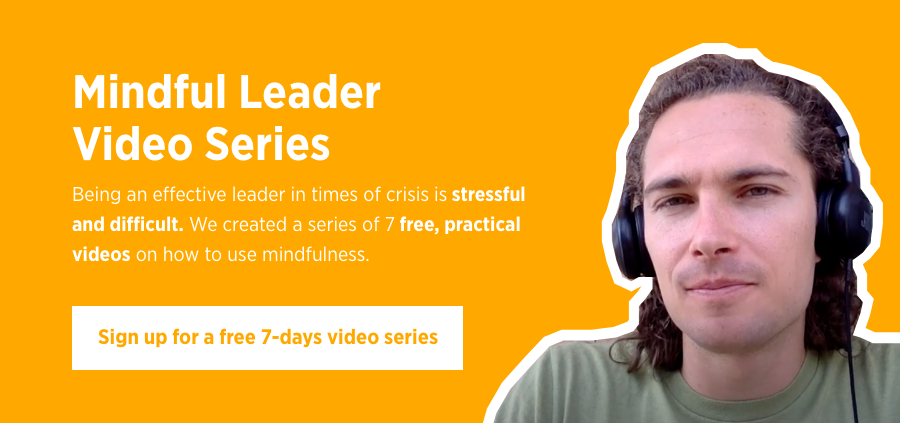
You can listen to the full interview via our podcast or you can read the main conversation highlights below.
What are the biggest problems we face as leaders today?
This is a huge question and one that I'm just beginning to scratch the surface on, because as a cardiologist I've spent 20 years in medicine taking care of patients, and frankly never viewing myself as a leader, and only by accident in the last few years as I've been mumbling and murmuring in the trenches, as we say about how life might be for patients and their providers if we made some more humane changes. Even though I'm father of three and married. I bristle a little bit at, even the word leader, because there's an implication there that there is one who leaves and one who is being led. And there's almost a dis-empowerment built into the concept of leadership.
I believe there are three elements, there's the leader herself or himself. There are the people who are being led or on a team. And then there's the relationship between the two.
- I think if we look at the breakdown of leadership that has to do with what happens within the mind of many leaders. We go from someone who has a vision for change for positive change to someone who really is feel stuck perpetuating, an organization which really can be overwhelming. And we lose our curiosity and we become experts. And I think once we become experts as leaders, we lose humility, humility, and we lose touch with the wisdom of the people that we are hoping to lead to a better future.
- The second element are those who are quote being led or on the teams, and there are so many factors right now in our society, making it hard to be led or to follow a leader. One is distraction, we know about, we're living in an attention deficit society right now, from our devices to the news reports to advertising etc. So, even at work, people are distracted. And that's one, and then the second one I think the biggest element within the second feature here is a mistrust and really think there's a mistrust among employees, team members of their leaders, and the sources of the mistrust come down to a misalignment of core values.
- The third big element, the breakdown of leadership, has to do with the connection between leader and the led and that has to do with communication. And I think scant attention is being paid to the value of this. Number one, what are we trying to communicate, number two, how do we communicate. Because communication itself is changing rapidly. And for communication to occur, we have to be aware in real time of both of those. Of how we are encoding, our messages or our signals and how they will be decoded by the receiver. So, there's a whole theory of communication there. And I think the future of leadership has to take into account all of this.

Your favorite quote, credo or mantra?
There is one that was introduced to about two years ago only. And I've been a work in progress for the last 47 years that I will continue to be for as long as I breathe. And this particular quote has shifted the way I approach. Every thought that enters my mind. And every possible collaboration with another person, or even possible shift to make the world a little bit better.
"The answer to how is yes."
This is it was what I have been needing for so many years to stop me from saying no to opportunities. This allows you to take a mindset that anything that I can conceive is possible. Not in an unrealistic way or in a magical way, in a very rational way, and it's a way for me to quickly undo my mind's natural tendency to find reasons why things can't be the way that I would like them to be.

What is mindful leadership and why is it important
Mindful leadership has a few elements.
It's a commitment of someone who wears the mantle of leader to develop a deep and ongoing awareness of his or her internal emotional cognitive states and commit to becoming aware of that same internal state of the people that he or she is working with and that's what mindful awareness is and to do it in a way that is connective, creative, generative, positive and not in a way that's destructive and negative. And reflexively critical, so that would be the non judgmental aspect. In other words, mindful leadership is a mindset of a leader to connecting with others and to connecting one's own values, putting it in a different way with an other's values, finding ways to connect those two to find the line.
The big why is connection.
Connection to two things:
- Its connection to our deepest values. So often we live on autopilot, day to day, and we don't even think about what values are today. For example, I lived for a decade, unaware that I was looking like a very cold unfeeling person, almost like a jerk. And that is not who I am. And yet, I was lacking this deep awareness of what was happening in my body. And so it's a connection to what are my values. What that means, what values do I choose. You can't tell me what my values are and I won't tell you what your core values are. That's the beauty of being a creative human being.
- The second point of connection is the connection between all beings. Connection with the world, with the universe, not to get overly mystical here and I'm careful with the word spiritual, but I mean it in the sense of positive psychology sense of self transcendence. And that's connection with something beyond ourselves.
So we have to first be in touch enough with ourselves, so that then we can connect to a much larger narrative about what's happening in the world and how I am helping things move forward or backwards.
.jpeg?width=300&name=0(1).jpeg)
If you have dinner with anyone, dead or alive, who would it be?
Leonardo da Vinci
How does one become a more mindful leader?

Yeah. So it's. There are four practical steps. And I do believe that leadership is a skill that can be learned just like playing the violin or kicking a soccer ball well. And so this is where we get into the fun part is learning theory, right how do people learn how to be leaders, and this is still also very much in evolution in our learning and development departments. What I would say is, there are four competencies or skills that we can start learning today.
- The first one is, if we haven't already been making this choice when we wake up in the morning, we make a choice that we get to control or choose our reaction to things. So the first is is a level of self mastery, I can't lead anyone else, it's impossible, unless I've begun to lead myself.
- The second step, I would say has to do with an awareness that we are organisms, we're animals and getting very real here, we have these primal reflexes we get angry we get frustrated, we get sad, angry, fearful. And so we have to develop a skill of becoming calm. The second step is learning to regulate our nervous system.
- The third step has to do with getting a very clear sense of what our values are. Going back every day and saying, yes, I'm a leader but in what direction? What direction, where am I leading, where am I going? We spend so much time focusing on the how of leadership that we don't remind ourselves that where are we actually going.
- And then the last, I would say, is a skill that can be taught, is the ability to communicate and connect deeply.

Final Suggestions / Recommendations
To commit to either a minute of rest, each hour or an hour of rest, each day. And when I say rest I mean, not allowing the mind to do its usual tricks, which is to keep planning and worrying, wondering, but to see what it's like to properly put the mind in the context of the whole organism of a body and the spirit at rest.
And so for me, I would have ultimately recommend people go on a retreat. And a retreat can be at your lunch break,instead of picking up your phone, choose to put it down. Set a timer for 10 minutes and that can be a retreat of the mind and do some of the practices Patrick and I teach. Or you can go on a longer retreat.
The only way to find, I think real happiness is to commit to listening to what we already know deep inside but has been drowned out. And so I would suggest a one minute retreat or a one week retreat or a three month retreat.

For more of Jonathan please find the links below:
Website: MindHeartNow.com
LinkedIn: Jonathan Fisher, MD, FACC
YouTube: happyheartMD
Instagram: happyheartMD





.jpeg?width=300&name=0(1).jpeg)



.jpg)